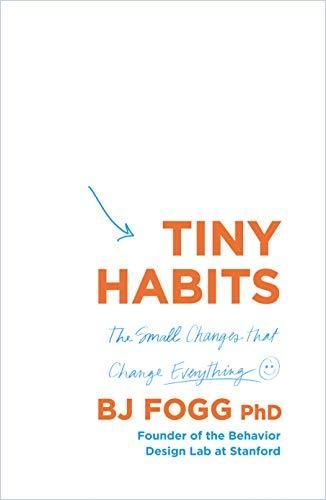B.J. Fogg brings his renowned habit-building strategies from the classroom to the page with great success.

Change Your Habits, Improve Your Life
Behavior scientist B.J. Fogg, founder and director of Stanford’s Behavior Design Lab – and one of Fortune’s “10 New Gurus You Should Know” – teaches individuals and professional coaches about human behavior.
To change your life for the better, he advises, think tiny. Fogg draws on research and personal experience to offer tools you can use to develop small habits that will, over time, grow and transform your life. When you begin by implementing easy, minimal versions of desired behaviors, Fogg asserts, you learn the pleasure of small successes – which lead to greater motivation and reinforcement of your new habits.
Simplicity changes behavior.B.J. Fogg
Publishers Weekly said of this New York Times bestseller, “Balancing useful practice…with his own story of personal transformation, Fogg’s convincing method will help any reader reconfigure their habits.” Gretchen Rubin, author of The Happiness Project, called the book “a valuable resource to anyone interested in changing their behavior (that is, all of us).”
Meaningful Change
To enact meaningful change in your life, Fogg teaches, take on tiny habits which can scale up to become substantial, sustained behavior shifts.
We are not the problem. Our approach to change is. It’s a design flaw – not a personal flaw.B.J. Fogg
Fogg recommends the Anchor, Behavior, Celebration (ABC) method. First, find an anchor moment – something you do daily, like washing your dishes – that prompts your new behavior. Perform the new behavior right after the anchor moment; then celebrate your win to create a positive feeling about your new behavior.
Motivation, Ability and Prompt
You change your behavior, Fogg explains, when motivation (your wish to take action), ability (your capacity to act) and a prompt (your signal to begin) come together at the same moment.
The greater your motivation, Fogg says, the more likely you are to perform a new behavior. The easier the action, the less motivation you need.
When motivation is high, people not only take action when prompted, they can also do difficult things.B.J. Fogg
Every behavior, Fogg makes clear, demands a prompt. To change an unwanted behavior, like too much late-night scrolling on social media, determine its prompt and eliminate it. Counterintuitively, he maintains that motivation is the least reliable of the three factors which shape behavior. It is also the hardest to adjust and often not the real obstacle to creating better habits.
Simplicity and Ease
Fogg cautions that dramatic, large-scale moves to change behavior often end in frustration, disappointment and self-criticism. The alterations that stick, he says, are the easy ones; then, success comes quickly and boosts motivation.
Ask yourself what, if anything, makes your desired behavior difficult to accomplish, and how you might make the behavior easier to do. If, for example, you want to start drinking more water, identify a first, essential action, like putting a water bottle in your purse each morning, which ensures you always have water on hand. Then, do the simplest possible version of your desired habit: Drink a single sip. This small step toward a new habit fuels a sense of accomplishment, which drives long term change. Fogg reiterates that easing the path to actions you want to take is crucial to this process.
Using anchors is a great approach to designing prompts because anyone can do it.B.J. Fogg
Fogg advises using an anchor moment to prompt your new habit’s tiny behavior. Your anchor should occur regularly and predictably. Ideally, the habit should fit with the anchor’s physical location, frequency and purpose. Refine your anchor to the specific last moment of a behavior: Instead of using teeth-brushing, in general, as a prompt, for example, Fogg suggests using the moment you put your electric toothbrush back on the charger.
Celebration
Good feelings reinforce behavior. Thus, Fogg insists, you should celebrate small wins because they lead to larger ones. He reports that feelings of success need to come immediately after the behavior for your brain to rewire and start a new habit. Your celebration can be a silent, inner “Good job!” or an out-loud “Victory!” yell.
Tiny habits are powerful, Fogg contends, because they expand through multiplication. When your tiny habit becomes part of your behavioral ecosystem, it spawns new, related tiny habits. Success raises confidence, and your good feelings increases motivation. This virtuous cycle makes you likely to repeat the behavior and, over time, form a new, positive habit. Improved confidence and motivation, Fogg avows, will lead you to tackle more challenging behaviors.
People change best by feeling good, not by feeling bad.B.J. Fogg
Fogg encourages you to reinforce your emerging identity by surrounding yourself with others who share it, by updating your social media profile, and by sharing or teaching what you learn.
Rational Solutions
The success of Fogg’s method speaks for itself, as do the pretty much rapturous reviews this work received from mainstream critics and from professionals in the habits and motivation business. He writes simply, directly and with clarity, and breaks down his guidance into basic components anyone can understand and follow. Fogg leaves behind questions of personality or self-doubt to vest in actions – simple actions you can always take, regardless of your mood. In a field full of strategies that rely on emotion, Fogg stands out as a rational thinker, problem solver and effective presenter. If you want to create new habits, begin here.
Other well-regarded works on changing your habits include Atomic Habits by James Clear, Think Again by Adam Grant and The Power of Habit by Charles Duhigg.




